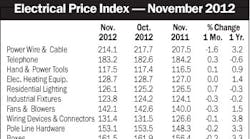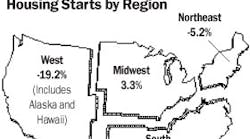The current industry obsession with private labeling is being driven by a desire to build distributor brands, an increased focus on creating market share, decreasing gross margins and brand apathy, according to an article on private labeling to be published in this month’s issue of Electrical Wholesaling as part of a multi-part series on the subject.
According to the articles’ authors, Allen Ray, president, Allen Ray Associates, Arlington, Texas, and David Gordon, principal, Channel Marketing Group, Raleigh, N.C., at its most basic level, private labeling is a strategy to earn the business of those customers who don’t value the brand of established products and are primarily interested in buying electrical products at the lowest possible cost.
Despite all of the current interest in private labeling, most electrical distributors will never offer their own brands of products. Yet they face the same pressures as those who do. While they may not privately label products, they might demand access to “value” brands from their existing manufacturers or seek alternative sources of supply.
A thirst for more market share. The electrical wholesaling industry has long been a market-share game, and the strategies to increase share really haven’t changed much over the years. To increase market share and grow, electrical distributors must outsell competitors, pursue multiple market segments, open new locations, buy into new market areas or acquire low-price competitors to eliminate competition.
An alternative strategy is emerging: using low prices to take market share. To meet customer demands and maintain or improve their margins, electrical distributors want lower product-acquisition costs. A percentage of this cost savings can then be passed to customers, enabling the distributor to capture a greater share of the customer’s wallet. Distributors see manufacturers lowering their production costs by sourcing products in countries with low costs of production, and they want to employ a similar strategy.
The pursuit of price. Part of this fixation on low prices seems to be a reflection of the “as long as it lasts a year” mentality reportedly common with many residentially oriented electrical contractors. This mentality drives distributors to consider private labeling, the gray market, brokers, offshore brands and lesser-known suppliers.
According to one electrical distributor who responded to the survey, “Contractors are mainly interested in low-price products, especially in the housing market. Distributors should be able to offer a low-price option to compete with big-box suppliers. It’s up to our manufacturers to create the market preference for their products.”
Electrical distributors recognize that private labeling and this low-price mentality disrupts their manufacturer relationships but many are more concerned with their profitability. In addition, some national chains have started private labeling products because they believe their company brands are stronger than their vendors’ brands.
One wholesaler said if an electrical distributor with a private-labeling strategy doesn’t earn the enhanced gross margins that private-labeled products reportedly produce, “all this process does is push manufacturing off-shore, lower the overall price point in the marketplace, lower the quality of the product itself and lower the profitability of the distributor.”
Brand apathy. Over the past 20 years, electrical distributors have increasingly invested in their brands to build customer allegiance. While business relationships were, and remain, the foundation for customer loyalty, successful electrical distributors have actively developed services and communicated their points of differentiation to their customers.
This investment is paying dividends and has enabled the distributor to exert more influence in the channel, enabling them to influence which manufacturers’ products are sold in a given marketplace. In fact, contractor research conducted for clients by Allen Ray Associates and Channel Marketing Group has repeatedly shown that where customers buy is more important than which brands they buy.
For example, to build its corporate brand, Graybar Electric Co., St. Louis, has changed its advertising from a product-orientation to more a customer-focused orientation that de-emphasizes the brand of the manufacturer’s product. This has enabled the company to more effectively influence the customer’s product purchase decision. Graybar’s experience supports the findings of a research study published several years ago by the National Association of Electrical Disitributors (NAED), St. Louis, showed that 74 percent of purchase decisions could be influenced by electrical distributors.
Distributors in the industrial distribution and home remodeling markets are familiar with private labeling, too. According to Adam Fein, Pembroke Consulting, Philadelphia, W.W. Grainger Inc., Lincolnshire, Ill., currently has more than 9,000 privately labeled stock-keeping units (SKUs). These SKUs account for $400 million in sales — 7 percent of the company’s total.
Home Depot, Atlanta, recently announced its OrangeWorks line, with a new fire extinguisher manufactured by Kidde, and already has the country’s largest ceiling fan company – Hampton Bay.
Private labeling is common in the global electrical industry. Several years ago, Rexel SA, Paris, created a “competing” distributor in France, called Coaxel. This company carries name brands, as well as its own brands. According to recent Rexel press release, “The Coaxel network has been instrumental in supporting sales growth in the residential end-market, helping the company achieve a 10.4 percent sales increase in a market that was mainly led by the small contractor segment.”
Are low prices really worth the hassle? Ultimately, private labeling comes down to product cost, and the jury is still undecided about the long-term value of the rock-bottom pricing that privately labeled product may offer. Electrical distributors that private-label products may gain price advantages, but they must consider whether potentially losing relationships with traditional manufacturers is worth the risk.
Electrical distributors who responded to the Allen Ray Associates/Channel Marketing Group survey on product liability didn’t hold back when commenting on this controversial issue. Following is a sampling of their comments.
What Distributors Are Saying About Private Labeling Distributors
Electrical distributors who responded to the Allen Ray Associates/Channel Marketing Group survey on product liability didn’t hold back when commenting on this controversial issue. Following is a sampling of their comments.
“Manufacturers are obviously upset over the topic, but the fact is that most are not manufacturing much of their own products either.”
“Liability is, and should be, of primary concern.”
“Private labeling should be used only on a very few product lines, and where brand names do not matter.”
“Manufacturers need to stop milking the old products so hard and price more proactively and defensively.”
“Name-brand manufacturers are producing products for national chains.”

